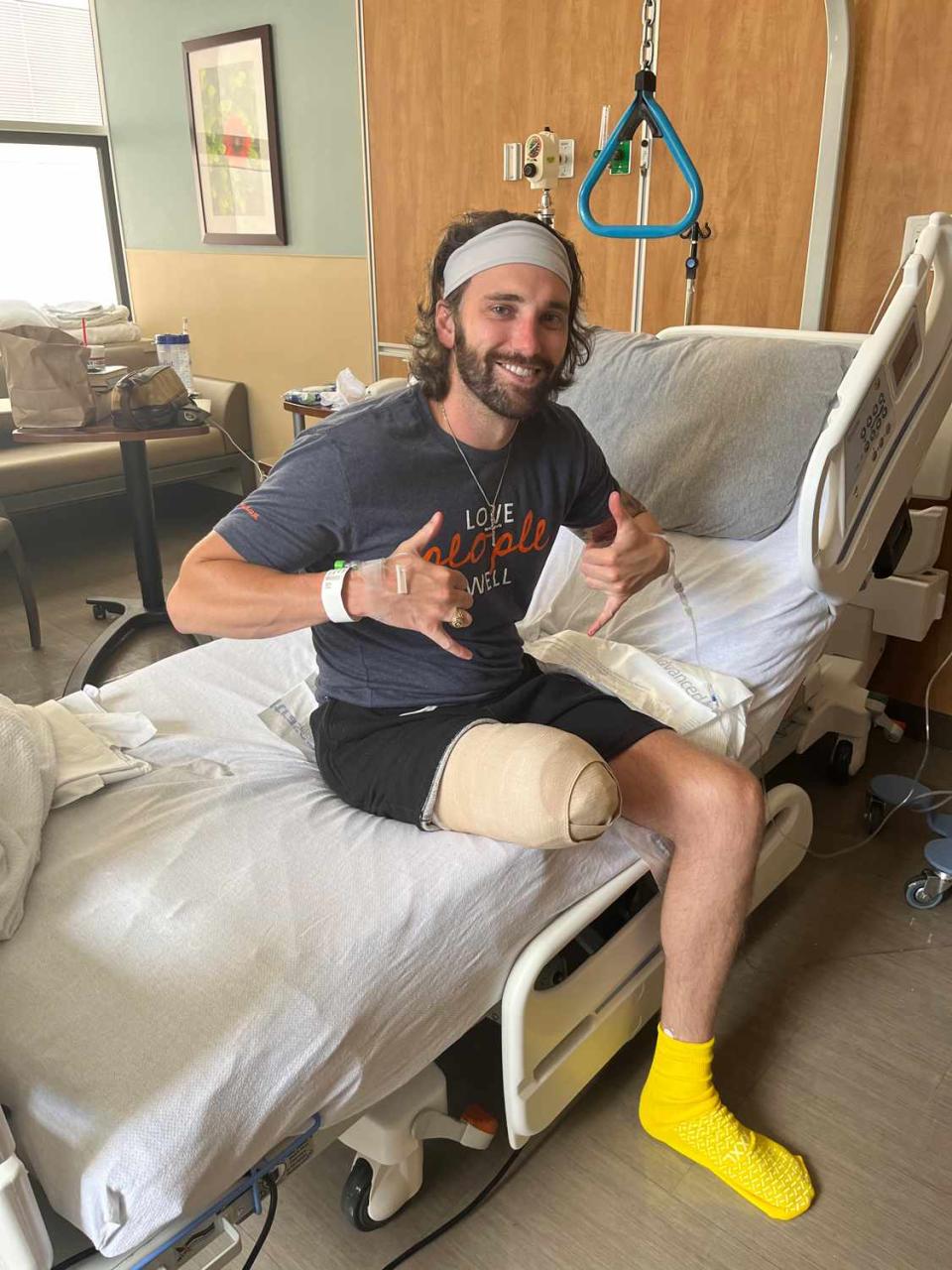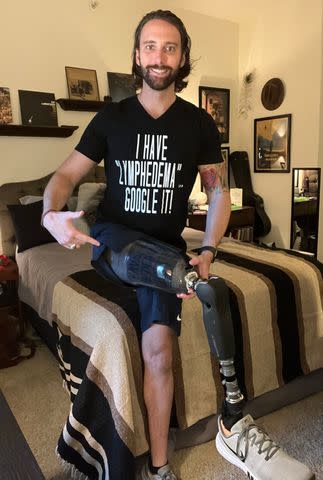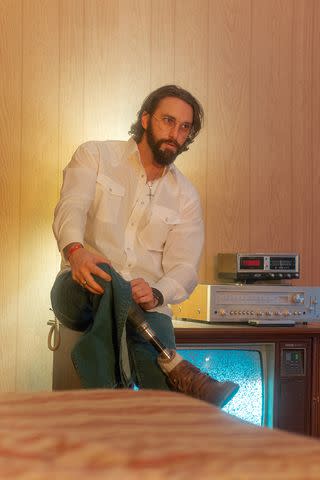Cam Ayala Opens Up About Life as an Amputee: 'The Biggest Challenge Is Letting Go of Who I Used to Be' (Exclusive)
The former Bachelorette contestant, who has the swelling condition lyphmodema, is making a documentary about his limb loss journey to "bring hope to other amputees"

Cam Ayala is learning to live with his new physical reality.
Last summer, The Bachelorette contestant had his leg amputated after struggling with lymphedema, a chronic disease he was born with that causes swelling.
"The biggest challenge is letting go of who I used to be," Ayala tells PEOPLE exclusively, sharing his year-long emotional and physical journey post-amputation.
The Houston-based Ayala plans to release a documentary about his limb loss experience around the time of his one-year anniversary of his operation in June.
"I'm doing this to bring hope to other amputees," he says. "I don't care if you had your limb loss or amputation 20 years ago, or two weeks ago, it's never too late to regain your mobility and regain your quality of life."

On Season 15 of The Bachelorette, Ayala pulled Hannah Brown aside and shared his experience with lymphedema. "I really wanted to be transparent and as open as possible," he says. He explained that someday he might need to have his leg amputated — and that he'd had multiple surgeries to try to save it. He wanted her to know that if there was an action-adventure date, he might have to hang back.
"I said, 'I don't want you to feel sorry for me,'" he recalls. "This is just who I am and what I've been through, and it does give me a very different kind of strength."
Unfortunately, the network edited out the details of lymphedema.
"One of the guys in the mansion told her I was making up this medical sob story for a pity rose – and unfortunately she believed him, and I got sent home," Ayala says. "I had to live with that – being vulnerable and transparent about a disease I was never public about. You go from saying nothing about it, to the next thing you know, 8 million people know your story."
That launched his journey as a patient advocate for lymphedema. "We turned the tragedy into triumph," he says. He partnered with a lymphedema non-profit and befriended Kathy Bates, with whom he says he's developed "a really close friendship."
Related:'BIP' 's Cam Ayala Teams Up with Kathy Bates to Raise Awareness for Lymphedema: 'My Lymphedema Sister'
Ayala first started experiencing signs of lymphodema when he was 11, and felt pain in his right knee. The unexplained pain ran up and down his leg.
At first, his parents dismissed it as growing pains. But an orthopedic surgeon saw something troubling on an X-ray and did a bone biopsy. The biopsy ruled out cancer but exacerbated his lymphedema symptoms.
Doctors first suggested amputation as a possibility in 2016, but he resisted. "I was in denial," he says. "I was like, 'I'm going to beat this. I'm going to do everything to avoid that at all costs.'"
Ayala ended up having 18 operations to try to save his leg, including a full knee replacement in 2021.
But after a year of physical therapy and rehab he could only move his knee 45-degrees and was experiencing "intense pain." He went to a different surgeon for a second opinion who explained the knee replacement had been "botched," he says.
Fixing it would require three additional surgeries, and if he still required amputation after that, surgeons would likely have to cut much higher, which would make fitting a prosthetic more challenging, he explains.
He decided to be proactive and move forward with amputation.
"I knew that if I wanted to still live with my aspirations of being a husband and an active father and being a Little League coach, I had do something," he says. "I had already done everything I could to save the leg."
He spent two months before his surgery working with a personal trainer, "to get all the other parts of my body as strong as I can."
Ayala connected with other amputees on social media to learn what to expect, and uses the #CAMputee tag on Instagram to find shared experiences.
"That, honestly, gave me so much hope," he says. "It's such a collaborative and welcoming community that I knew that I wasn't going to be alone."
Still, he worried about his future: Would he find a wife post-amputation? "What woman's going to want to be with me now that I don't have all four of my extremities?" he says. "Will I find myself attractive?"
His leg was amputated on June 22, 2022. Ayala's Pastor, Eric Huffman of the Maybe God Podcast was there when he woke from surgery.
"After the first two minutes of tears and anger and a couple moments of prayer," Ayala says. "My pastor had a gift for me. He brought me a book, and a sock. … He says, 'I didn't get you a pair, because I figured you wouldn't need it anymore.' We both cracked up."
A documentary crew, The Story, formed by members of his church, filmed Ayala's journey, from his last steps with two legs to his first steps with a prosthetic limb, which he received in August 2022.
Related:Cam Ayala Takes Fans Inside Recovery as He Practices Walking After Leg Amputation: 'CAMputee'
He did physical therapy twice a week for three months; now he does it once a week.
"He's very driven," says Kristen Reeves, his physical therapist and program manager of Limb Loss Services at TIRR Memorial Hermann. "He's making tremendous progress."

Ayala also does CrossFit and plays wheelchair basketball and volleyball. He's getting fitted for a running blade, and his next goal is to travel to Ecuador in September. He plans to hike a 19,000-foot mountain with a group of other amputees to raise awareness, and also to raise money to help people who can't afford prosthetics.
Like many amputees, he experiences phantom pain, he says.
"I'll randomly get this burning sensation in my right calf, but I don't have the right calf anymore. It's crazy. But, over time, the intensity and the frequency has decreased," he says.
Emotionally, there are still hard moments, he says.
"It's easy to say, 'Was there one other surgery I could have done to save my leg to avoid this amputation? Did I make the right decision? When I have those moments of negative self-talk or the whole 'what if' scenario, I've learned to quickly silence that and to know that just because I lost a leg doesn't mean I lost who I can become."
Now a limb-loss advocate, he hopes to inspire and give hope to others. He volunteers at a boxing gym in an underserved community to help teach "self-respect and self-control" to young people.
"They see a one-legged guy in there throwing hands in the boxing ring and that gives them some inspiration that they can do hard things, too," he says.
For more People news, make sure to sign up for our newsletter!
Read the original article on People.

 Yahoo Sports
Yahoo Sports 
